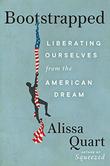The concept of the American dream is broken. Yes, hard work—an important virtue—is sometimes rewarded, but that is often not the case, and millions of poor Americans are not to blame for their situations. The income and wealth divides in this nation are as wide as they’ve ever been; while the number of billionaires grows and wages remain stagnant, the rift only gets worse. (Don’t get me started on the minimum wage, which is not nearly enough to allow a full-time worker to afford an apartment in any U.S. city. Even working two minimum-wage jobs doesn’t cut it.)
 Two March books address the situation, poking holes in the flawed assumption that if you just work hard, you will succeed financially. In Bootstrapped: Liberating Ourselves From the American Dream (Ecco/HarperCollins, March 14), journalist Alissa Quart explodes the myth of “bootstrapping,” which she describes as the “every-man-for-themselves individualism” that underpins the free market system. This significant follow-up to Squeezed: Why Our Families Can’t Afford America, our reviewer says, delivers a forceful “contrarian rebuttal of the notion that wealthy Americans deserve everything they have and that the ‘poor are responsible for their own poverty.’ ” In our late-stage capitalist democracy, too many people live paycheck to paycheck, often working multiple jobs while rent, food, and other expenses surpass wage increases. Quart “proposes a more meaningful safety net of cooperative work and mutual aid, whereby workers pool their capabilities and time to produce needed and sustainable things while being their own bosses,” delivering an urgent “repudiation of gig-economy capitalism that proposes utopian rather than dystopian solutions.”
Two March books address the situation, poking holes in the flawed assumption that if you just work hard, you will succeed financially. In Bootstrapped: Liberating Ourselves From the American Dream (Ecco/HarperCollins, March 14), journalist Alissa Quart explodes the myth of “bootstrapping,” which she describes as the “every-man-for-themselves individualism” that underpins the free market system. This significant follow-up to Squeezed: Why Our Families Can’t Afford America, our reviewer says, delivers a forceful “contrarian rebuttal of the notion that wealthy Americans deserve everything they have and that the ‘poor are responsible for their own poverty.’ ” In our late-stage capitalist democracy, too many people live paycheck to paycheck, often working multiple jobs while rent, food, and other expenses surpass wage increases. Quart “proposes a more meaningful safety net of cooperative work and mutual aid, whereby workers pool their capabilities and time to produce needed and sustainable things while being their own bosses,” delivering an urgent “repudiation of gig-economy capitalism that proposes utopian rather than dystopian solutions.”
 Any examination of wealth inequality in the U.S. would be incomplete without input from Matthew Desmond, the Pulitzer Prize–winning author of Evicted. His latest, Poverty, by America (Crown, March 21), is a dissection of the many dimensions of poverty in America, which differs from that in many parts of the world. In the U.S., it’s “not for lack of resources,” the author notes, but rather what our reviewer describes as a lack of “compassion” but also the lack of “a social system that insists that everyone pull their weight—and that includes the corporations and wealthy individuals who, the IRS estimates, get away without paying upward of $1 trillion per year.” Desmond experienced poverty in young adulthood, and his firsthand knowledge and diligent sociological fieldwork are on full display in this perfect follow-up to Evicted. Touching on health care, housing, transportation, child care, and the lack of an effective social safety net, the author clearly delineates the countless systemic problems that plague our economic and social systems.
Any examination of wealth inequality in the U.S. would be incomplete without input from Matthew Desmond, the Pulitzer Prize–winning author of Evicted. His latest, Poverty, by America (Crown, March 21), is a dissection of the many dimensions of poverty in America, which differs from that in many parts of the world. In the U.S., it’s “not for lack of resources,” the author notes, but rather what our reviewer describes as a lack of “compassion” but also the lack of “a social system that insists that everyone pull their weight—and that includes the corporations and wealthy individuals who, the IRS estimates, get away without paying upward of $1 trillion per year.” Desmond experienced poverty in young adulthood, and his firsthand knowledge and diligent sociological fieldwork are on full display in this perfect follow-up to Evicted. Touching on health care, housing, transportation, child care, and the lack of an effective social safety net, the author clearly delineates the countless systemic problems that plague our economic and social systems.
He also offers hope on eliminating poverty, which he believes “would not take a miracle” but rather political will to muster “about $177 billion,” as our reviewer notes, “which would help end hunger and homelessness and ‘make immense headway in driving down the many agonizing correlates of poverty, like violence, sickness, and despair.’ ” That kind of money could be raised in a matter of months with an equitable tax system that made billionaires and corporations pay their fair shares—not to mention even the slightest trimming of the bloated defense budget. Of course, observes our reviewer, “Fortune 500 CEOs won’t like Desmond’s message for rewriting the social contract—which is precisely the point.” Policymakers must make smarter decisions and stop adding to the problem while claiming to care about any of the real, on-the-ground economic issues that directly affect their constituents.
Eric Liebetrau is the nonfiction and managing editor.



































